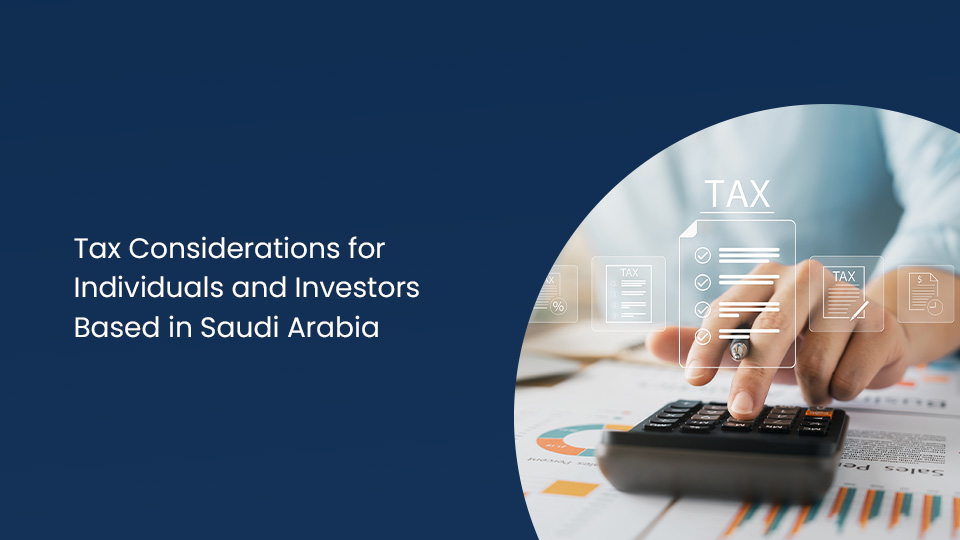Saudi Arabia’s economy is growing rapidly, attracting investors and professionals globally. As the Kingdom evolves under the Vision 2030 strategy, it’s important to understand the tax system in Saudi Arabia for those looking to invest or work here. The tax system has distinct characteristics that are quite different from those in Western countries, so it’s essential for foreign individuals and businesses to understand their responsibilities.
Whether you’re an expatriate worker, a foreign investor or planning to start a business, the tax system in Saudi Arabia has several key aspects. These include Zakat obligations, corporate taxes, VAT requirements, and withholding tax considerations. This blog will help you understand the main tax factors, compliance requirements, and effective strategies to successfully manage the Saudi tax system.

Understanding Saudi Arabia’s Tax System – An Overview
Saudi Arabia has a dual tax system that categorises taxpayers in specific ways. This unique system means your tax duties are mainly influenced by your nationality and the type of business structure you have. Saudi nationals and GCC citizens primarily pay zakat, an Islamic obligation, which is their main tax contribution. On the other hand, foreign-owned companies are subject to a corporate tax rate of 20%.
The system gets more interesting when you look at what is taxed and what isn’t. The kingdom doesn’t charge personal income tax on salaries, making it attractive for expatriate workers. However, investment income, capital gains from securities, and business profits are subject to different regulations. Foreign investors must understand how these different income types are handled under Saudi law.
In 2020, Saudi Arabia implemented a 15% value-added tax (VAT) and excise taxes on certain products such as tobacco and sugary drinks, adding another layer to the system. These indirect taxes apply to all residents and businesses in the Kingdom, regardless of nationality. The combination of these various tax types requires thorough planning and understanding.

Saudi Residency Rules and Tax Implications
Tax residency in Saudi Arabia has specific rules that can have a major impact on your obligations. The Kingdom assesses residency based on your physical presence and economic ties, meaning that spending significant time in the country can lead to tax residency status. An individual qualifies as a tax resident if they are in the country for at least 183 days in a calendar year or have a permanent home there. For expatriates and foreign investors, this status affects tax obligations, including filing requirements. Expatriates with Saudi residency permits (Iqama) usually qualify as tax residents.
Foreign investors must be aware of their reporting obligations, particularly if they have tax obligations in their home countries. For example, US citizens still have to file US taxes regardless of their residency status in Saudi Arabia. This requires careful coordination between various tax systems to prevent double taxation problems.

Specific Taxes and Their Impact
Zakat and corporate tax are quite different. Zakat is charged at 2.5% of net worth for Saudi and GCC nationals, while corporate tax is at 20% on taxable profits for foreign-owned businesses. These two systems operate alongside each other, resulting in distinct compliance requirements for different taxpayers.
Withholding tax is another important factor, especially for foreign service providers and investors. In Saudi Arabia, the tax rates range from 5% to 20% on payments to non-residents, including dividends (5%), royalties (15%), interest (5%), and management or consultancy fees (up to 20%).
A 15% VAT applies to most products and services, impacting business activities and investment returns. Certain sectors face additional excise taxes, especially those involved in the production of tobacco, energy drinks, and carbonated beverages. These taxes require additional registration and compliance processes, increasing the overall tax compliance load.
Real estate transactions now have a new 5% Real Estate Transaction Tax (RETT), replacing the old VAT on property sales. Rental income is taxed either as corporate tax or zakat based on ownership, and recent tax cuts offer favourable conditions for foreign investors. Capital gains on real estate transactions must also be carefully evaluated under the current tax regulations.

Tax-Efficient Structures and Compliance Tips
High-net-worth individuals and investors gain from organised approaches to Saudi taxation. Legal frameworks can enhance tax efficiency while ensuring full compliance with Saudi Arabia’s tax laws and foreign investment rules. The secret lies in planning ahead and correctly applying these frameworks.
In the Saudi system, compliance timing is also very important. Registering early, keeping accurate records, and filing on time helps avoid expensive penalties and issues. The tax authorities have become more advanced now, so professional compliance is a must. It’s vital to work with local tax experts who know Saudi law and international tax planning for complex cases.
Foreign property ownership regulations are also connected with tax planning, increasing the complexity. Investors must manage both taxes efficiently and in adherence to foreign investment laws and property ownership restrictions. This requires proper planning that takes into account every aspect of Saudi business law.

How Analytix Can Help You
Analytix offers complete tax planning and compliance services specifically for the Saudi Arabian market. Our team has extensive knowledge of local tax law, zakat obligations, VAT obligations, and international tax planning.
We cover all aspects of Saudi taxation, including corporate tax planning, zakat compliance, VAT registration and filing, and withholding tax management. We also specialise in cross-border investment structures that help foreign investors enhance their tax situation while ensuring compliance with local regulations. We help our clients lessen liabilities and expenses with effective strategies and planning.
Conclusion
Saudi Arabia’s tax system offers both benefits and challenges for businesses and investors. The absence of personal income tax, along with attractive corporate tax rates, makes it an appealing option for many. However, the unique aspects of zakat, VAT obligations, and withholding tax require careful planning.
Understanding these factors has become more important as the Kingdom continues its economic transformation and attracts more foreign investment. This goes beyond just understanding the opportunities; it requires expert guidance to manage the tax system effectively.
If you want to make sure your investments and operations meet Saudi tax requirements while enhancing your financial goals in this dynamic and growing economy, reach out to us immediately.

























